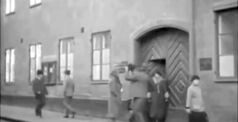Five bestowments
Jump to navigation
Jump to search
The five bestowments (Oharic: āmisiti sit’ota; literally: “five gifts”) were awards given by Orioni monarchs to extraordinary officials, ostensibly to reward them for their accomplishments. While the nature of the bestowments was probably established during the Queendom, there was no record of anyone receiving them until the First Empire.
The five bestowments became typically a sign of a powerful official becoming part of the imperial household. For the rest of Orinese history, it became rare for an adoption or intermarriage to happen without the five bestowments having been given sometime before.
The five bestowments and their meanings, from least to most important:
- Gift of clothes: when the official writes well and appropriately, to show their good deeds.
- Gift of armed guards: when the official is brave and willing to speak the truth, so that they can be protected.
- Gift of a wagon and horses: when the official is appropriate in his modesty and walking in an appropriate manner, so that they do not need to walk any more.
- Gift of wine: when the official is filially pious, so that they can sacrifice the wine to their ancestors.
- Gift of a red door: when the official maintains their household well, so that their household can be shown to be different.
See also
References
- ↑ Lasse Møller, Closed red wooden door, 1 November 2018.



